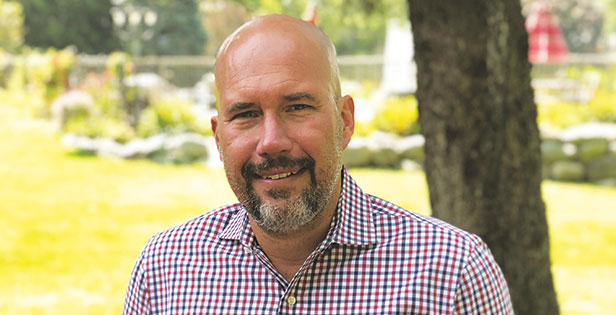September 26, 2018
How to Build a Community on Social Media
This distributor builds goodwill on social media to drive traffic naturally.
Takeaways:
1. Use your website and social media to tell a story.
2. Offer content that’s relevant to your target audience.
3. Build email lists organically – never buy them.
The Pro: Dave Klonke
Title: President & CEO
Company: Right Hook Branded Merchandise (asi/308898), Rochester Hills, MI, and St. Petersburg, FL

Dave Klonke, president & CEO of Right Hook Branded Merchandise
When Dave Klonke started his company two years ago, he wanted to position it as a branded merchandise agency. He also planned to leverage social media as a way to display its capabilities.
“I want to show the breadth of what we can do,” he says. “Our posts help us get calls and comments from people, like ‘Those mugs you did for that company are awesome!’ It sparks their imagination. Everyone wants tons of followers, likes and comments, but I’ve found that people notice, even if they’re not saying anything.”
Klonke makes sure that he takes composed shots of most of the projects his company puts together and posts them on Instagram. He then links to Instagram on his website so the images are in both places. Klonke says they focus mainly on Instagram because of the visual nature of promo products. They also have a business page on Facebook, what Klonke calls a good storytelling platform, and they use LinkedIn to generate leads. “We put our handles on everything, like invoices, voicemails and emails,” he says. “That all drives traffic organically.”
But like many who’ve established business pages on Facebook, Klonke is frustrated with the new algorithms that favor interactions between individuals rather than businesses. So posts by friends take precedent over posts by businesses on a user’s news feed, making organic reach much more difficult.
“They’ve liked your page. Why wouldn’t they be able to see your post?” asks Klonke. “It’s like if you send an email to a list and it only goes to so many people on that list. We find that Instagram is much better for organic reach.”
Podcast
ASI's Vinnie Driscoll and Patrick Kennedy discuss Facebook's latest newsfeed algorithm tweak and how folks in the promo industry can overcome this challenge.
Despite the recent trend of hiring social media experts, Klonke prefers to manage it single-handedly. “I think you have to be the expert yourself, as the owner,” he says. “They can’t tell your story like you can. Social media also can’t be the only way you market. It's an in-between touch as we build relationships face-to-face. We don’t want to just be order-takers. We want to manage a whole campaign.”
As a small company with just two full-time employees, Klonke knows it would be challenging to compete in organic search with large distributors, so he focuses mainly on having a quality website that people can find through social media and referrals.
“I can’t compete with the large, exclusively online distributors,” he says. “If people are searching for products, they’ll end up at those guys anyway. I just don’t have the resources. Instead, we want to be out there creating relationships. And we do; we get a lot of referral business.”
To provide quality content that bolsters those relationships, Klonke sends out an e-newsletter recipients have opted into receiving. While it often contains information on product trends, it could also be their seasonal catalog promotion. Once it drops, Klonke tracks the open rate.
After recent algorithm changes, posts on business Facebook pages now reach just 2% of followers.(Hubspot)
“It really works for driving traffic to the website,” he says. “There’s always an uptick once we send it out.”
Klonke says it gives his company credibility and positions his team as experts. “It’s a way to talk to them without actually talking to them,” he says.
To maintain a quality list, Klonke makes sure that all recipients have either opted in or agreed to be added. They’re usually eager, especially after they’ve placed an order with Right Hook.
“We never buy lists, and we have a very low unsubscribe rate,” he says. “If people haven’t opted in, they’ll ask you to remove them and it leaves a bad taste in their mouths. This way, if I call the list, they'll know me.”
Watch This
In this “Expert Secrets” video from ASI, sales trainer and ASI Show speaker Rob Liano discusses content marketing and social selling as strategies that can set a company apart from its competition as they prospect and serve their clients. Watch it below: